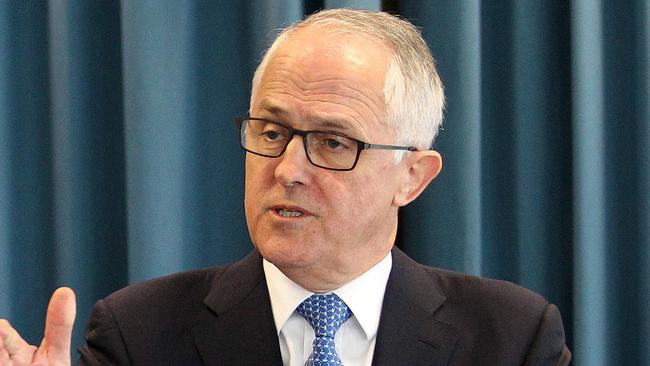PM locks in postal vote on gay marriage
The federal government will launch a postal plebiscite on same-sex marriage as soon as next week.

The federal government will launch a postal plebiscite on same-sex marriage as soon as next week, as Malcolm Turnbull sets a December 7 deadline to decide the reform in parliament, backed by Liberal MPs who endorsed the “people’s vote” in a high-stakes showdown last night.
The government is claiming a “high degree of confidence” that it can stare down court challenges to the optional postal vote on the controversial social question, clearing the way for a free vote in parliament if Australians back the change.
Mr Turnbull — who earlier admonished cabinet colleagues over his frustrations that some had played a hand in encouraging MPs who backed same-sex marriage — secured overwhelming support for the plebiscite from the special Liberal meeting in Parliament House after a week of infighting that fuelled talk of a threat to his authority from the deep animosities over changing the Marriage Act.
Aiming to stop the internal brawl from deepening the government’s political problems, Mr Turnbull will seek an agreement from the Coalition partyroom today to embrace the postal vote if the Senate once again rejects the original election commitment of a compulsory plebiscite.
Nationals leader Barnaby Joyce prefers the original plebiscite but he and his party colleagues can accept the back-up plan of a postal vote, giving it support in today’s meeting.
After a week of pressure from Liberals to drop the public vote and pursue a conscience vote in parliament, reform advocates including Queensland MP Warren Entsch only secured seven votes in a partyroom meeting of almost 80 members. Mr Entsch was joined by Victorian MPs Tim Wilson and Jason Wood, NSW Liberals John Alexander and Trent Zimmerman and West Australian senator Dean Smith in voting for a conscience vote in a show of hands. Another key advocate, Brisbane MP Trevor Evans, was absent for family reasons but sent a letter to argue for policy change.
Mr Wood supported a conscience vote but told the meeting that a postal vote would be a good compromise. Neither Mr Zimmerman nor Mr Wilson signalled they would cross the floor.
The meeting heard 28 Liberals speak in defence of the “people’s vote” and canvass the idea of using the optional postal vote to let 15.7 million voters have their say on the matter, if they chose to send back the ballot papers.
The show of hands revealed the minority support for a conscience vote and there was no call for a show of hands on the plebiscite.
The Australian can reveal Mr Turnbull yesterday admonished cabinet colleagues over the encouragement of dissident backbenchers to bring on a bill that would have allowed for a free vote on gay marriage in the parliament. A senior source said Mr Turnbull was “robust” during the early morning meeting to discuss the issue ahead of the partyroom meeting at 4pm.
“Malcolm was desperately upset that some of his cabinet had been part of this,” the source said.
However, senior conservative MPs have privately praised Mr Turnbull’s handling of the issue, claiming he had effectively killed off any chance that the seven rebel MPs would now push ahead with plans to introduce their own private member’s bills in support of gay marriage and force a vote in the parliament.
“The way he set this up and handled it was impressive,” said a senior conservative MP.
The Australian understands Finance Minister and deputy Senate leader Mathias Cormann will lead negotiations with the seven MPs. Some senior Liberal sources said there was a “waning” appetite for a postal plebiscite among the majority of the partyroom, calling it the “surrender option” compared with the election pledge.
Former prime minister Tony Abbott cautioned against the postal vote yesterday, saying its legitimacy could be challenged if the turnout was low and it would be better to keep attempting to get the original plebiscite through the upper house.
That view did not carry the day in the Liberal partyroom as MPs backed an approach that offers the promise of a verdict from the electorate within months and a free vote in parliament by Christmas.
Senator Cormann, who is acting Special Minister of State and holds responsibility for the popular vote, said the original plebiscite would go back to the Senate this week to vote again on a bill rejected last November.
“Clearly our preference is to give effect to the commitment we made at the last election to its fullest extent possible, which is why we’ll be asking the Senate to support the compulsory attendance plebiscite,” Senator Cormann said.
Senate crossbenchers have vowed to oppose the plebiscite.
Senator Cormann said the postal vote would lead to a vote in parliament if Australians backed same sex marriage. There will be no free vote in parliament, however, if Australians reject same sex marriage in the postal vote.
An advocate for change said the new approach kept up the “double standards” that had been the hallmark of the debate.
Mr Entsch last night declared he reserved his right to call on a vote in the House of Representatives to force a decision on same-sex marriage, signalling he could cross the floor to side with Labor, the Greens and the independents.
The Australian understands the process to set up and run the postal vote would take several months but could be concluded by late November, in time for the final fortnight of parliament to hold a free vote on marriage assuming Australians back the change. Parliament rises for the year on December 7.



